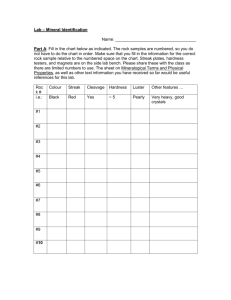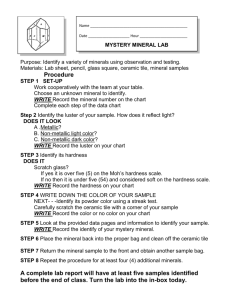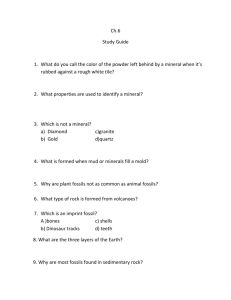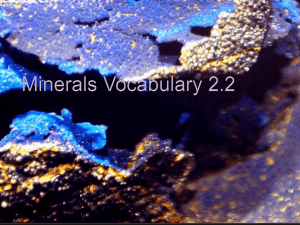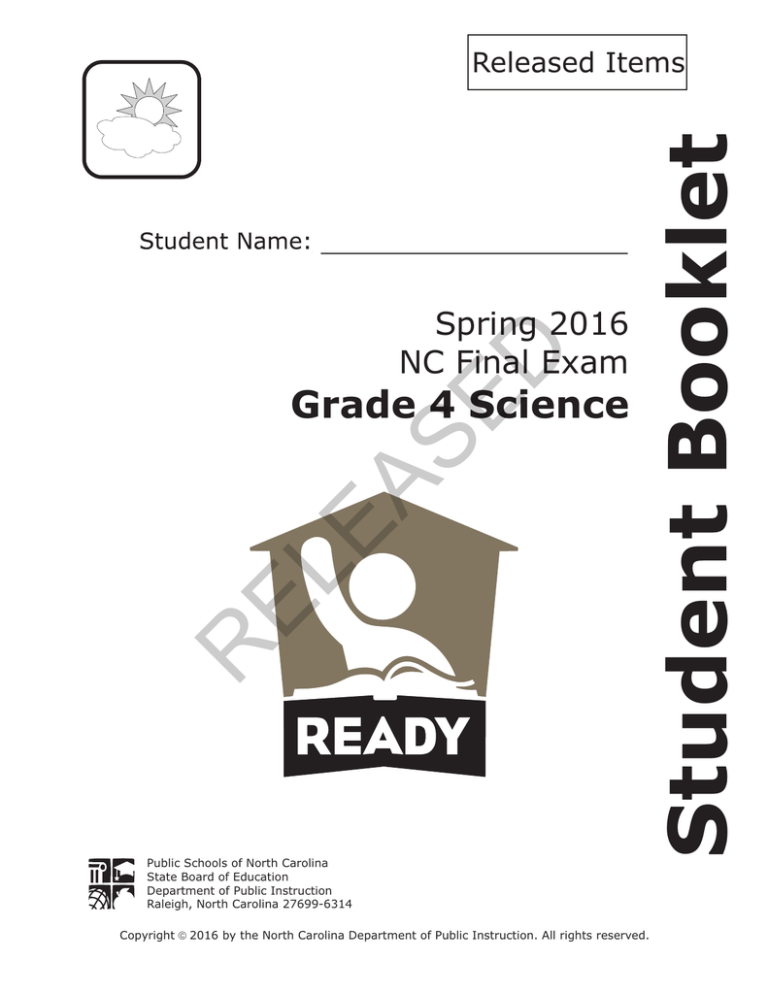
D
Spring 2016
NC Final Exam
R
EL
EA
SE
Grade 4 Science
Public Schools of North Carolina
State Board of Education
Department of Public Instruction
Raleigh, North Carolina 27699-6314
Copyright ã 2016 by the North Carolina Department of Public Instruction. All rights reserved.
Student Booklet
Released Items
GRADE 4 SCIENCE — RELEASED ITEMS
A
The two balls will be pulled toward each other.
B
The two balls will be pushed away from each other.
C
The two balls will touch and move in circles around each other.
D
The two balls will touch and then remain connected with each other.
rub the mineral along a ceramic plate
B
view the mineral under bright lights
C
place salt on top of the mineral
D
use fire to melt the mineral
EA
SE
A
D
A geologist wants to test the streak of a mineral. What should the geologist do?
EL
2
A metal ball has an electrical charge. What will happen when it is brought near
another metal ball with the same electrical charge?
R
1
1
Go to the next page.
GRADE 4 SCIENCE — RELEASED ITEMS
A student performs tests on two mineral samples. The chart below shows the data
collected from the tests. The hardness of Mineral Y has not been determined.
Mineral Chart
Mineral
Color
Hardness
Streak
Luster
Special Features
X
white
3
colorless
pearly
bubbles with acid
Y
white
?
colorless
pearly
bubbles with acid
D
What could it mean if Mineral Y has a hardness of 3?
Mineral X is softer than Mineral Y.
B
Mineral X is harder than Mineral Y.
C
Mineral X and Mineral Y could be different minerals.
D
Mineral X and Mineral Y could be the same mineral.
EL
EA
SE
A
R
3
2
Go to the next page.
GRADE 4 SCIENCE — RELEASED ITEMS
4
This chart describes the formation process for four rock samples.
Formation Process for Four Rock Samples
Formation Process
W
Sand grains are cemented together.
X
Pressure and heat are applied to rock.
Y
Rock melts and hardens beneath the ground.
Z
The remains of small organisms and shells are buried under the seafloor.
D
Rock Sample
B
X
C
Y
D
Z
EA
W
R
EL
A
SE
Which rock sample would be classified as an igneous rock?
3
Go to the next page.
GRADE 4 SCIENCE — RELEASED ITEMS
This is an illustration of a waxing moon.
SE
D
5
What causes the moon to appear this way?
B
The moon is moving away from the shadow of Earth.
C
Light produced by the moon is being reflected by Earth.
D
The moon is moving into the shadow of Earth.
EL
EA
Light from the sun is being reflected on part of the moon.
Which can a scientist learn from studying a plant fossil?
R
6
A
A
how long ago the plant lived
B
how the plant became extinct
C
how many plants lived in the area
D
how many animals lived near the plant
4
Go to the next page.
GRADE 4 SCIENCE — RELEASED ITEMS
A well collects rainwater.
B
A boat travels toward the shore.
C
A tree branch falls to the ground.
D
A river carries sediment to the ocean.
D
Bluebirds live in open meadows and trees. The trees and plants near a meadow
were removed to build a shopping center. How could this affect the bluebird
population?
It could give the bluebird population more space to live.
B
It could force the bluebird population to find a new place to live.
C
It could cause all of the bluebird population in the area to die.
D
It could provide a larger selection of food for the bluebird population.
SE
A
EA
9
A
The water level in a lake is decreasing. How could this affect the plants and
animals living in the lake?
EL
8
Which is an example of a slow change to Earth’s surface?
A
It might provide more space for the plants and animals.
B
It might reduce the amount of space for the plants and animals.
C
It might help the animals living in the lake, but it may harm the plants.
D
It might help the plants living in the lake, but it may harm the animals.
R
7
5
Go to the next page.
GRADE 4 SCIENCE — RELEASED ITEMS
Snakes will build nests in other places.
B
Birds will migrate to the north.
C
Frogs will search for a mate.
D
Bats will hibernate in caves.
D
A grasshopper eats a blade of grass. What is grass?
It is food because it is green.
B
It is food because it provides energy.
C
It is food because it produces oxygen gas.
D
It is food because it is found in the ground.
SE
A
EA
12
A
What is the source of energy animals need to survive?
A
minerals
B
water
C
food
D
air
EL
11
Which will most likely occur during winter in the United States?
R
10
6
Go to the next page.
GRADE 4 SCIENCE — RELEASED ITEMS
The chart shows the properties of different vitamins.
Vitamin Chart
How does it help the body?
Stored in the body?
W
helps the body with
vision and bone growth
Yes
X
helps the body with
getting energy from food
No
Y
helps the body heal
and also absorb iron
No
Z
helps the body absorb
calcium for bones
SE
D
Vitamins
Yes
EA
Why is it important to eat foods with Vitamin X and Y each day?
They help to improve eyesight.
B
The body cannot keep its own supply.
C
They help the body grow stronger bones.
D
The body needs to save them for future use.
EL
A
R
13
7
Go to the next page.
GRADE 4 SCIENCE — RELEASED ITEMS
14
A scientist was digging in the ground for fossils. The pictures below show the
fossils she found.
Fossil 2
D
Fossil 1
How do these two fossils compare?
B
Both are plant fossils.
C
Fossil 1 is from a plant, while Fossil 2 is from an animal.
D
Fossil 1 is from an animal, while Fossil 2 is from a plant.
EA
SE
Both are animal fossils.
EL
Which is a way people can improve the environment for animals that live near the
coast of North Carolina?
A
doubling the number of commercial fishing boats in the ocean
B
increasing the number of fish a person can catch and keep
C
building new homes and hotels closer to the ocean
D
removing litter and trash from the area every day
R
15
A
8
Go to the next page.
GRADE 4 SCIENCE — RELEASED ITEMS
A
using camouflage
B
traveling in herds
C
going underground
D
hunting at night
SE
Approximate Hardness of
Common Objects
Object
fingernail
copper penny
iron nail
glass
steel file
streak plate
EA
Mohs Scale of
Hardness
Mineral Hardness
1
talc
gypsum
2
3
calcite
4
fluorite
apatite
5
feldspar
6
quartz
7
topaz
8
9
corundum
10
diamond
D
The charts below show the Mohs Scale of Hardness and the Approximate Hardness
of Common Objects.
Hardness
2.5
3.5
4.5
5.5
6.5
7.5
EL
17
Which could help animals survive in areas that have many wildfires?
R
16
How was the hardness of feldspar determined?
A
It could scratch a steel file, but it could not scratch a streak plate.
B
It could scratch glass, but it could be scratched by a steel file.
C
It could scratch fluorite, but it could be scratched by apatite.
D
It could scratch quartz, but it could be scratched by topaz.
9
Go to the next page.
GRADE 4 SCIENCE — RELEASED ITEMS
This is the end of the Grade 4 Science Released Items.
Directions:
1. Look back over your answers for the test questions.
2. Make sure all your answers are entered on the answer sheet. Only what is
entered on your answer sheet will be scored.
3. Put all of your papers inside your test book and close the test book.
D
4. Stay quietly in your seat until your teacher tells you that testing is
finished.
R
EL
EA
SE
5. Remember, teachers are not allowed to discuss items from the test with
you, and you are not allowed to discuss with others any of the test
questions or information contained within the test.
10
GRADE 4 SCIENCE — RELEASED ITEMS
Type2
Key
Percent Correct3
Standard
1
MC
B
65%
4.P.1.2
2
MC
A
70%
4.P.2.2
3
MC
D
80%
4.P.2.2
4
MC
C
57%
4.P.2.3
5
MC
A
68%
4.E.1.2
6
MC
A
67%
4.E.2.2
7
MC
D
60%
4.E.2.3
8
MC
B
54%
4.L.1.1
MC
B
49%
4.L.1.1
MC
D
45%
4.L.1.2
MC
B
68%
4.L.2.1
MC
C
45%
4.L.2.1
13
MC
B
28%
4.L.2.2
14
MC
A
85%
4.E.2.1
15
MC
D
85%
4.L.1.1
11
12
EA
EL
10
R
9
SE
Item Number
D
Grade 4 Science
RELEASED Items1
Spring 2016
Answer Key
1
GRADE 4 SCIENCE — RELEASED ITEMS
Item Number
Type2
Key
Percent Correct3
Standard
16
MC
C
48%
4.L.1.2
17
MC
B
47%
4.P.2.2
These released items were administered to students during a previous test administration. This
sample set of released items may not reflect the breadth of the standards assessed and/or the
range of item difficulty found on the NC Final Exam. Additional items may be reviewed at
http://www.ncpublicschools.org/accountability/common-exams/released-items15/. Additional
information about the NC Final Exam is available in the Assessment Specification for each exam
located at http://www.ncpublicschools.org/accountability/common-exams/specifications/.
D
1
This NC Final Exam contains only multiple-choice (MC) items.
SE
2
Percent correct is the percentage of students who answered the item correctly during the
Spring 2014 administration.
R
EL
EA
3
2
GRADE 4 SCIENCE — RELEASED ITEMS
Standard Descriptions
Only clarifying objective descriptions addressed by the released items in this booklet are listed
below. A complete list of the North Carolina Essential Standards for Science and Social studies
may be reviewed at http://www.ncpublicschools.org/acre/standards/new-standards/.
4.P.1.2 (Forces and Motion)
Explain how electrically charged objects push or pull on other electrically charged objects and
produce motion.
D
4.P.2.2 (Properties and Change)
Explain how minerals are identified using tests for the physical properties of hardness, color,
luster, cleavage and streak.
SE
4.P.2.3 (Properties and Change)
Classify rocks as metamorphic, sedimentary or igneous based on their composition, how they
are formed and the processes that create them.
4.E.1.2 (Earth in the Universe)
Explain the monthly changes in the appearance of the moon, based on the moon’s orbit around
the Earth.
EA
4.E.2.1 (Earth History)
Compare fossils (including molds, casts, and preserved parts of plants and animals) to one
another and to living organisms.
EL
4.E.2.2 (Earth History)
Infer ideas about Earth’s early environments from fossils of plants and animals that lived long
ago.
4.E.2.3 (Earth History)
Give examples of how the surface of the earth changes due to slow processes such as erosion
and weathering, and rapid processes such as landslides, volcanic eruptions, and earthquakes.
R
4.L.1.1 (Ecosystems)
Give examples of changes in an organism’s environment that are beneficial to it and some that
are harmful.
4.L.1.2 (Ecosystems)
Explain how animals meet their needs by using behaviors in response to information received
from the environment.
4.L.2.1 (Molecular Biology)
Classify substances as food or non-food items based on their ability to provide energy and
materials for survival, growth and repair of the body.
4.L.2.2 (Molecular Biology)
Explain the role of vitamins, minerals and exercise in maintaining a healthy body.
3

